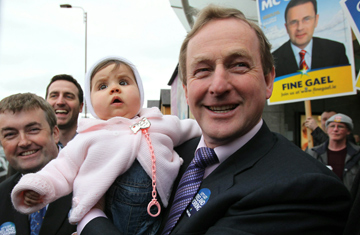
Irish opposition leader Enda Kenny, right, of the Fine Gael Party holds 8-month-old Emma Brady as he canvasses in Crumlin, Ireland, on Feb. 22, 2011
The last time Ireland went to the polls, it was one of the wealthiest countries in Europe, with a booming construction industry, an average per capita income of €200,000 ($270,000) and economic growth of 6% per year.
What a difference four years makes. Now Ireland is preparing for its general election on Friday, Feb. 25, in a state of financial ruin, struggling under €95 billion ($130 billion) of debt, spiraling unemployment and a crippled housing market. As the lives of the Irish have changed dramatically, so have the issues that concern them, and the candidates find themselves fighting an election unlike any they've ever known.
Irish voters have already decided to force change by vowing not to re-elect Fianna Fail, the party that has governed the country for the past 14 years. Instead, they appear set to elect Enda Kenny, leader of the country's other main conservative party, Fine Gael, as Prime Minister. But whether Kenny ends up leading a government on his own — with the support of some independents — or forming a coalition with the center-left Labour Party led by Eamon Gilmore depends on how Kenny and his opponents handle the shift in focus among the electorate.
In the past, Ireland's politicians won votes by solving local issues such as local sanitation problems, delayed benefit payments and the building of schools. But this time, the discussions on voters' doorsteps are not about potholes on roads but the big gaps in public finances, rescuing the troubled banks and the €85 billion ($115 billion) IMF-E.U. bailout the government accepted in November. For the first time in a long time, the Irish are suffering together, with the country's economic pains spread across all ages and incomes.
"Historically, 'parish-pump politics' has been the biggest determinant — and Ireland is unusual in that regard. Policy has always played second fiddle," David Farrell, professor of politics at University College Dublin, tells TIME. "In a moment of crisis, national issues become more dominant. So it's not surprising that anecdotally, people are paying more attention to policies and national issues."
In a reversal of voters' priorities since the last election, polls show that over half of Irish voters think national policies will decide the election, while just a quarter think local issues are most important. The unemployment rate has more than tripled in the past four years, to 14%; many homes are in negative equity; and there is a mass emigration of young people: 50,000 are expected to leave the country this year. John Brennan, a 50-year-old security worker from the rural Carlow constituency, echoes the sentiment felt across Ireland when he says the bigger issues such as jobs and the economy now matter more than ever. "I'm worried for my family," he tells TIME. "Are they going to be able to work in the future, the way things are going?"
With the slogan "Let's Get Ireland Working," Kenny's Fine Gael party has laid out a plan for economic recovery to cu the annual deficit by €9 billion ($12 billion) over three years; it includes creating thousands of jobs, reducing waste of public resources, slimming the public sector and reforming the political system, as well as renegotiating the terms of Ireland's bailout. Previously dragging in the polls because of his poor communication skills — he even refused to take part in the first televised leadership debate of the campaign — Kenny has made up for his lack of charisma by offering up a strong team of potential Ministers and bringing new, talented candidates to the party. And his efforts seem to have worked, as a poll out on Monday, Feb. 21, gave him a 10-point jump to make him the nation's preferred future Prime Minister.
Kenny's closest opponent, Labour head Eamon Gilmore, has always been the more popular of the two, but having failed to capitalize on the country's opinion of the former trade-union leader, the party has seen a sharp decline in recent polls. Now it seems that Gilmore's best bet of joining the government is as part of a coalition with Fine Gael, in the role of Kenny's Deputy Prime Minister.
The two parties have been in government together in the past — the last time was a minority government from 1994 to 1997 — and their policies are broadly similar, although Labour emphasizes equality, supporting higher taxes for the wealthy, opposing benefit cuts and seeking a referendum on gay marriage, while Fine Gael wants to cut government spending and sell state assets instead of increasing income taxes.
Whether Ireland ends up with one ruling party or two, many voters are skeptical about what any politician can achieve, given the size of Ireland's economic mess. The only certainty is that whoever wins Friday's election faces a monumental task and will have to introduce painful spending cuts or tax increases to reduce the annual government deficit.
Kenny admits that everyone will have to suffer and cut back in the coming years. "No incoming government has ever faced the scale of economic challenge that the next government faces," he said to state broadcaster RTE radio. Whether a change of leader is enough to stem the tide of rising debt remains to be seen.
